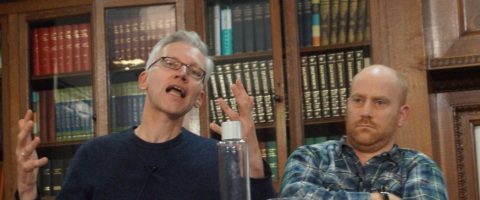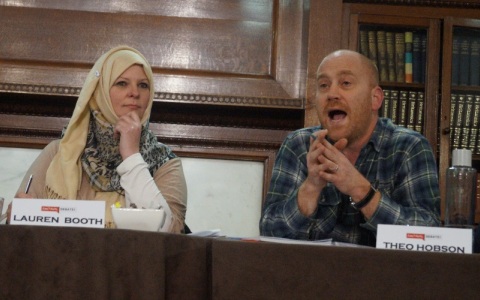The Islamic ‘reformation’ has started
by - 29th February 2016

ISLAM is being transformed by technology – according to historian Tom Holland and theologian Theo Hobson.
Speaking at a debate organised by the charity Islamic Education and Research Academy (iREA), which was founded by a Polish Catholic convert, both scholars agreed that the Islamic world is entering a period of internal reflection sparked by the internet.
‘There is a particular parallel between what happened in the sixteenth century to Christianity, and what is happening now in Islam in the form of the internet’, said Holland.
‘I think the internet has played a very similar role in the development of Islam. The internet is the printing press of the Islamic reformation.’
Like the development of print in the sixteenth century the internet allowed anyone, from any background, to study Islamic texts and develop their own ideas and arguments.
Rather than relying on often remote and distant authorities, said Holland, Muslims were now able to make up their own minds.
Theo Hobson, a freelance Christian theologian and writer, said the fact Muslims were debating the question of Islamic reformation proved that the process was already underway.
‘This whole discussion is a sign of the reformation of Islam.
‘It needs to clarify whether it believes in a theocratic model of religion and politics together, or whether it believes in affirming other points of view as valid.’
Hobson said that European Muslims had already been affected by western thought.
Christian ideas like the division between church and state were seeping into Islam, prompting Muslims to ask searching questions about their own faith’s relationship to the state and foreign Islamic religious authorities.
Politics
But was the question of Islamic reformation a political or a theological question?
Dr Taj Hargey, Chairman of the Muslim Education Centre of Oxford and founder of a gay- and women-friendly mosque in South Africa, was clear.
‘I would say the problem is theology, theology, theology.’
The use of the hadiths (sayings of Mohammed) to support Islamic law and fatwas (pronouncements by scholars) was damaging modern Islam as the collections were later interpretations of Qur’anic ideas and corrupted the original message of the Qur’an.
He held up Muslim integration into Indonesia from the thirteenth century as a model of Islamic adaptation into different cultures.
The earliest mosques in Indonesia looked like Hindu temples, Muslims married local women and became integrated into indigenous Indonesian society, he said. [For an alternative view read]
Comparing this active engagement with the Muslim situation in Britain, Hargey was pessimistic.
‘We’ve come here with our baggage.’
He left no doubt as to his preferred solution for Islam in Britain: ‘We need to be British Muslims,’ he said.
To reform, British Muslims had to break free from outside influence and unify notions of Britishness with Islam.
‘We need to cut the umbilical cord that ties us to Saudi-Arabia, to the Wahhabis, the salafis and all the other extremists there.
‘We want Islam to be open and liberal, inclusive and pluralistic, that belongs here and now.’
Disagreement
But Zara Faris, from the Muslim Debate Initiative (MDI), which is heavily funded by Saudi businessmen, disputed that Muslims had to buy into British culture just because they lived in Britain.
‘You can be somewhere but disagree.’
Rather than being a grassroots rethinking of the religion, she saw the idea of British Islam as being imposed, top-down, by politicians.
‘I’m not interested in a British version of Islam.
‘I’m not particularly interested in being force-fed any set of values, be they British values, American values, that I don’t have a say in what those values actually mean.
‘The Muslim world is in need of revival, not reformation.’
Dispute
Abdullah Al Andalusi, co-founder of the MDI who was reported by the Telegraph as having been sacked from Her Majesty’s Inspectorate of Constabulary (HMIC) after his superiors saw him defending extreme ideas on television, said it wasn’t a question of Islam accepting western ideas but the other way around.
‘Can western liberalism tolerate Islam?’
He argued that the changes in Middle Eastern Islam had been imposed by Europeans and created by colonialisation.
Echoing Faris, and Islamic ‘reformers’ down the ages, he said: ‘The Muslim world does have a problem, a very big problem but Islam does not need to be reformed, Muslims need to reform.’
Al Andalusi denies any allegations of extremism and has said Islamic State is not Islamic.
Controversy

The charity that organised the debate, the iERA, is controversial.
It was founded in 2009 by convert Abdur Raheem Green also called Tony, who has previously said Muslim husbands may beat their wives.
The charity caused further uproar when it attempted to segregate men and women at an event at University College London.
Bilal Philips, named as an unindicted co-conspirator in the 1993 World Trade Centre bombings, served on the iERA’s board of advisors.
In 2013 it protested against Tom Holland’s documentary Islam: The Untold Story and in May 2014 the Charity Commission opened a statutory inquiry into the iERA.
The Charities Commission said it had identified ‘a number of regulatory issues connected to the charity’s approach and policies for organising events and inviting external speakers and its associated records and documents.’
The inquiry is ongoing and Green is still Chairman of the iERA.
The iERA has denied accusations of homophobia, extremism and anti-Semitism.
Muhammad Hussain, Head of PR and Media, also said the charity did not receive money from the Saudi-Arabian government.
‘That is unequivocally wrong and I challenge anyone to prove me otherwise.
‘The iERA gets its funding from the Muslim community, standing orders and donors. It’s not state funded in any shape or form.’
We wish to make clear that Tom Holland is a Trustee of Lapido Media, but was not speaking at this event in that capacity.
